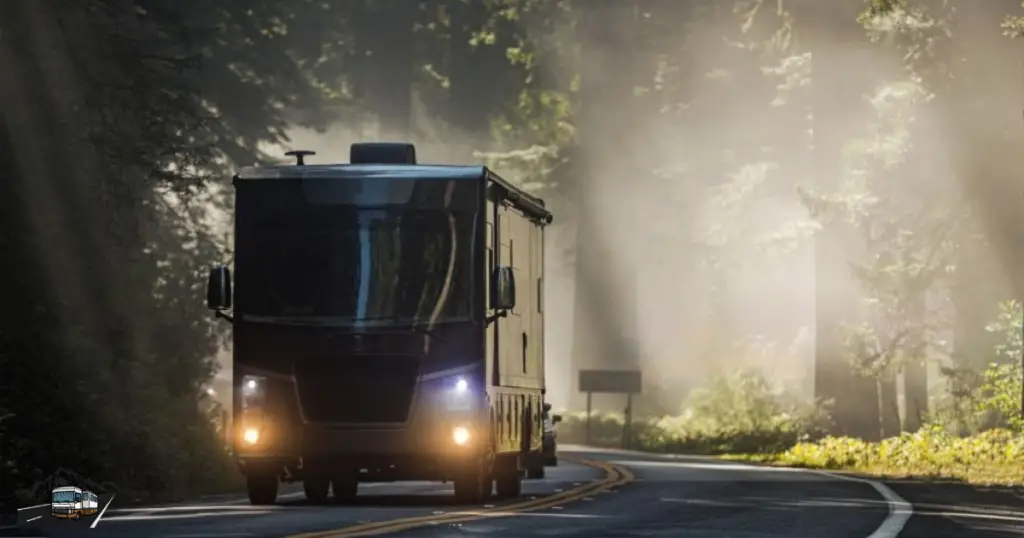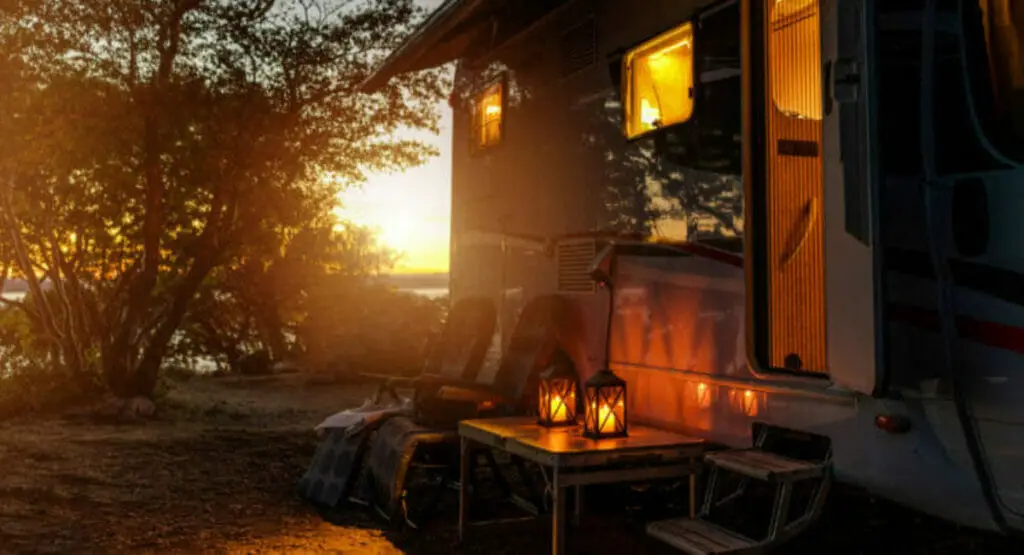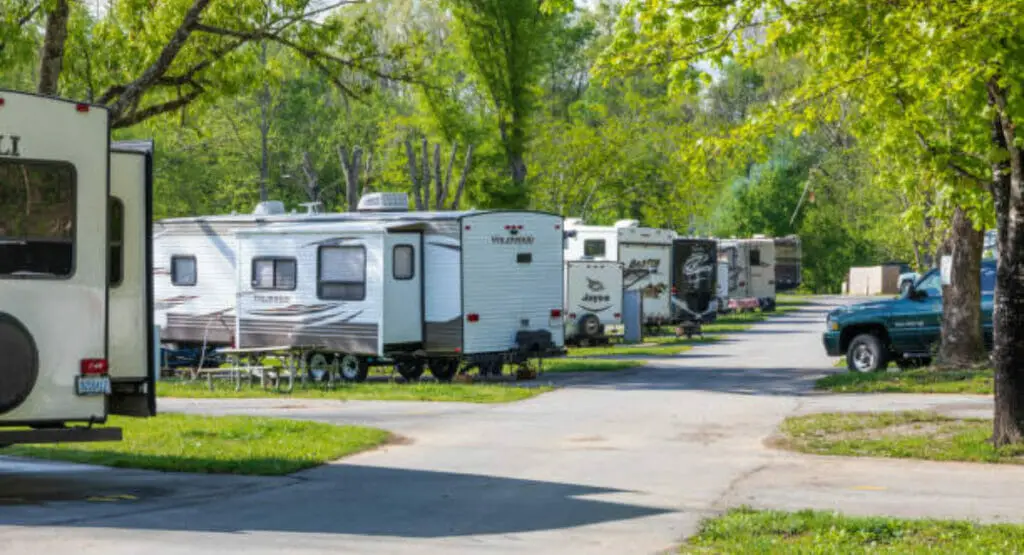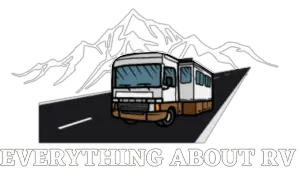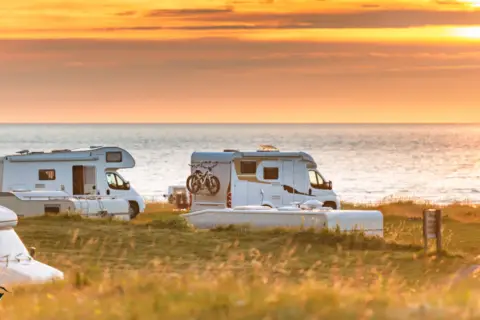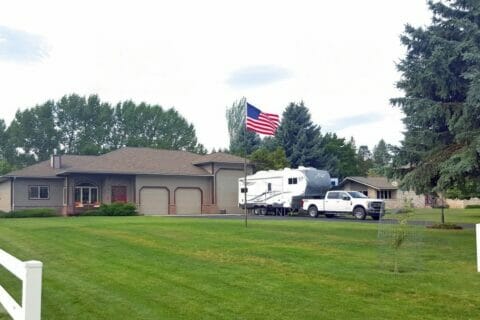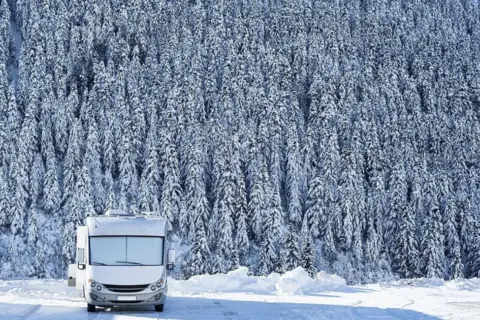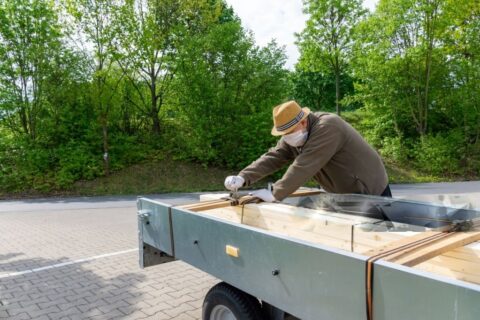Solo full-time RVing, a lifestyle choice that blends adventure, independence, and the open road. In this article, we’ll explore the ins and outs of this unique way of living, covering everything from the benefits and challenges to practical tips for those considering the plunge.
Introduction
Solo full-time RVing is a lifestyle that beckons the adventurous at heart. It goes beyond being a mere mode of travel; it’s a declaration of independence, a commitment to living in the moment, and a celebration of the open road. In this article, we’ll embark on a journey to unravel the essence of solo full-time RVing, exploring the benefits, overcoming challenges, and offering practical insights for those who dare to embrace the road alone. So, fasten your seatbelts, and let’s hit the highway of solo full-time RVing!
I. Benefits
Solo full-time RVing unfolds a world of unparalleled freedom and flexibility. Picture this: no fixed schedules, no nine-to-five grind, just you and the open road. The ability to chart your course spontaneously, change plans on a whim, and wake up to a different horizon each day is the essence of the solo RV lifestyle. Embrace the liberty to follow your curiosity, linger in breathtaking landscapes, and dance to the rhythm of your own journey. The benefits of flexibility and freedom make solo full-time RVing an exhilarating choice for those seeking adventure without constraints.
II. Challenges
For the solo full-time RVer, the allure of solitude is a double-edged sword. While the open road offers freedom and self-discovery, it also presents the challenge of isolation. Navigating the vast stretches of highway alone can sometimes lead to moments of introspection and loneliness.
1. Virtual Connections:
Embrace the power of technology to stay connected. Video calls, social media, and online RVing communities provide avenues to share experiences, seek advice, and form friendships from the comfort of your RV.
2. Community Engagement:
Actively participate in RV gatherings, both virtual and in-person. Attend meet-ups, join forums, and share your journey. The RV community is vast and welcoming, offering a support system for those on solo adventures.
3. Explore Shared Spaces:
When parked at campgrounds or RV parks, take advantage of communal areas. Strike up conversations with fellow travelers, sharing stories and creating connections. You might find kindred spirits sharing the same stretch of road.
4. Balance Solitude and Socializing:
While solo full-time RVing celebrates independence, finding a balance between solitude and socializing is key. Plan activities that allow for both introspection and interaction, ensuring a holistic and fulfilling journey.
5. Mindful Planning:
Incorporate stops at locations with social opportunities. Events, festivals, or even local attractions provide chances to interact with others, breaking the monotony of solo travel.
Solo full-time RVing is a unique path, and addressing isolation concerns is integral to maximizing the richness of the experience. By proactively seeking connections and balancing alone time with social interactions, solo RVers can turn the challenge of isolation into an opportunity for personal growth and meaningful relationships.
III. Choosing the Right RV
In the world of solo full-time RVing, the size of your mobile abode is more than a matter of square footage—it’s a pivotal decision that shapes your entire journey. Let’s explore why, when it comes to RVs, size indeed matters.
1. Maneuverability and Accessibility
Opting for a more compact RV provides a distinct advantage when navigating through tight spaces or winding roads. Maneuverability becomes your ally, allowing you to access off-the-beaten-path locations and hidden gems that larger RVs might struggle to reach.
2. Cost Considerations
Size directly influences the cost of your RV lifestyle. Smaller RVs generally come with a lighter price tag, making them an attractive choice for solo adventurers seeking an economical yet fulfilling life on the road. Save on initial expenses and ongoing maintenance costs.
3. Fuel Efficiency
In the journey of solo RVing, every mile matters. Smaller RVs often boast better fuel efficiency, stretching your travel budget and reducing your environmental footprint. Experience the freedom of the open road without constantly checking the fuel gauge.
4. Versatility in Camping Spots
Size dictates where you can set up camp. Smaller RVs provide greater flexibility, enabling you to park in a variety of campgrounds, from cozy spots in the woods to urban RV parks. Embrace the versatility to tailor your surroundings to your preferences.
5. Ease of Maintenance
Maintaining a smaller RV is less daunting. From routine maintenance to unexpected repairs, handling tasks becomes more manageable. Enjoy the peace of mind that comes with knowing your home on wheels won’t overwhelm you with upkeep demands.
6. Intimate Living Space
Solo full-time RVing is a journey of self-discovery and intimate connection with your surroundings. A smaller RV fosters a cozy atmosphere, eliminating excess space and emphasizing the essentials. It’s not about the square footage; it’s about the experience within those walls.
7. Parking Freedom
Size matters when it comes to finding parking spots. Smaller RVs offer more parking options, whether you’re exploring urban areas or seeking solitude in nature. Embrace the freedom to choose your parking spot without constraints.
8. Environmental Impact
A smaller RV is a step towards a smaller ecological footprint. Contribute to sustainable RVing by choosing a size that aligns with your needs, minimizing resource consumption, and leaving a lighter mark on the environment.
In the realm of solo full-time RVing, the size of your RV becomes a defining aspect of your journey. It’s not just about the dimensions; it’s about the doors of opportunity that open when you choose a size that resonates with your spirit of adventure. Size matters—make it matter for you.
IV. Essential Gear
Solo full-time RVing is an art, and every artist needs the right tools. Here’s a rundown of the must-have equipment that transforms your RV into a home on wheels:
1. Solar Power System
Harness the power of the sun to keep your adventure going. A solar power system ensures a steady supply of energy, letting you roam off-grid without worrying about running out of power.
2. Compact Cooking Essentials
A portable stove, versatile cookware, and a reliable coffee maker turn your RV kitchen into a culinary haven. Enjoy delicious meals under the open sky without compromising on flavor.
3. Comprehensive Toolkit
From minor repairs to unexpected fixes, a well-equipped toolkit is your on-the-go repair shop. Be your own handyman and tackle issues that may arise during your journey.
4. Portable Water Filtration System
Stay hydrated wherever the road takes you. A portable water filtration system ensures access to clean and safe drinking water, whether you’re parked in the wilderness or at a bustling campground.
5. Compact Laundry Solutions
Keep your wardrobe fresh with compact laundry alternatives. A portable washing machine or laundry bag designed for RV living ensures you’re ready for any social or outdoor event.
6. Navigation Tools
While technology is great, having traditional navigation tools like maps and a reliable compass as backups ensures you stay on course, even in remote areas with spotty signals.
7. Emergency First Aid Kit
Safety first! A well-stocked first aid kit is non-negotiable. Be prepared for minor injuries or unexpected health issues, giving you peace of mind as you explore.
8. Collapsible Outdoor Furniture
Create your outdoor oasis wherever you park. Collapsible chairs and a compact table allow you to enjoy meals, work, or simply relax under the open sky.
9. Portable Waste Disposal System
Proper waste disposal is essential. Invest in a portable system that makes handling waste convenient and eco-friendly, ensuring you leave every site as pristine as you find it.
10. Multifunctional Lighting
Versatile lighting options can transform the ambiance of your RV. From bright task lighting for cooking to cozy ambient lights for relaxation, choose a mix that suits your mood.
These must-have items cater to the practicalities of solo full-time RVing, turning your mobile dwelling into a self-sufficient and comfortable haven. Ready to hit the road fully equipped? Let the adventure begin!
VI. Planning Your Route
Embarking on the road as a solo full-time RVer is a thrilling adventure, and strategic route planning is your compass to a seamless and unforgettable journey. Here are essential tips to ensure your route is not just a path but a narrative of discovery.
1. Set Priorities:
Define your must-visit destinations. Whether it’s natural wonders, cultural hotspots, or hidden gems, establishing priorities shapes the core of your journey.
2. Balance Travel Days:
Avoid burnout by balancing travel days with rest days. Factor in days where you can immerse yourself in a location, explore at a leisurely pace, and recharge for the next leg.
3. Weather Awareness:
Stay ahead of weather conditions along your route. Adjust your itinerary to avoid extreme weather, ensuring a safe and comfortable journey.
4. Tech Tools:
Leverage navigation apps and GPS technology. They not only guide you efficiently but can provide real-time updates on traffic, road conditions, and nearby attractions.
5. Backup Routes:
Plan alternative routes in case of unexpected road closures or detours. Flexibility is key, and having backup plans ensures you can adapt to changing circumstances.
6. Camping Reservations:
For popular destinations, especially during peak seasons, consider making campground reservations in advance. This guarantees a spot and allows you to plan your route around confirmed stays.
7. Local Insights:
Tap into the wisdom of local communities. Engage with fellow travelers, connect with locals, and gather insights on hidden gems or off-the-beaten-path treasures.
8. Budget Wisely:
Plan your route with a clear understanding of your budget. Factor in fuel costs, campground fees, and daily expenses. This ensures financial peace of mind throughout your journey.
9. Maintenance Checkpoints:
Schedule regular maintenance checks for your RV. Identify service points along your route, ensuring your home on wheels is in optimal condition for the road ahead.
10. Solo-Friendly Stops:
Include stops that cater to solo travelers. RV parks with solo-friendly atmospheres or events that encourage individual participation add a social dimension to your journey.
11. Stay Informed:
Keep abreast of travel advisories, road closures, and local regulations. Staying informed ensures a smooth and hassle-free passage through different regions.
12. Create a Digital Itinerary:
Develop a digital itinerary with details of each stop, including contact information, reservation details, and notable attractions. This digital guide becomes a handy companion on your journey.
13. Culinary Exploration:
Explore local cuisines along your route. Research and plan stops at renowned eateries or farmers’ markets, adding a flavorful dimension to your solo RV adventure.
14. Document Your Journey:
Capture the moments. Whether through a travel journal, photography, or vlogging, document your journey. It not only preserves memories but can also inspire others on similar paths.
15. Embrace Spontaneity:
While planning is crucial, leave room for spontaneity. Some of the most memorable experiences happen when you veer off the planned route and embrace the unexpected.
VI. Budgeting
Embarking on a solo full-time RVing adventure is a liberating experience, but financial planning is the engine that keeps the wheels turning smoothly. Here are key financial considerations to ensure your journey is not just memorable but sustainable.
1. Establish a Realistic Budget:
Begin with a comprehensive budget that covers all aspects of your journey—fuel, campground fees, maintenance, groceries, and entertainment. Be realistic and factor in unforeseen expenses.
2. Emergency Fund:
Create a dedicated emergency fund. Life on the road can bring unexpected surprises, and having a financial safety net provides peace of mind during unforeseen circumstances.
3. Fuel Efficiency:
Optimize fuel efficiency to minimize one of the significant ongoing costs. Maintain your RV, drive efficiently, and consider alternative routes to maximize fuel savings.
4. Campground Memberships:
Explore campground memberships that offer discounts. From national park passes to RV club memberships, these can significantly reduce accommodation costs.
5. Meal Planning:
Plan your meals to control food expenses. Stock up on essentials at local markets, cook in your RV, and indulge in dining out selectively to savor local cuisines without overspending.
6. Work and Travel Opportunities:
Explore work and travel opportunities to supplement your income. Many solo RVers engage in remote work, freelancing, or seasonal jobs to sustain their journey financially.
7. Seasonal Adjustments:
Be mindful of seasonal variations in expenses. Campground fees, fuel prices, and availability can fluctuate based on the time of year. Adjust your budget accordingly.
8. Travel Insurance:
Invest in travel insurance that covers your RV and personal belongings. This safeguards you against potential financial losses in the case of accidents, theft, or unforeseen circumstances.
9. Online Deals and Discounts:
Leverage online platforms and apps for deals and discounts. From fuel apps that track the cheapest stations to discounts on campground bookings, technology can be your ally in budget-conscious travel.
10. Flexible Spending:
Maintain flexibility in your spending. Unexpected opportunities or detours may arise, and having the financial flexibility to seize them adds an extra layer of enjoyment to your journey.
11. Regular Financial Check-ins:
Conduct regular financial check-ins to assess your spending and adjust your budget accordingly. Being proactive allows you to stay on track and make informed financial decisions.
12. Community Resources:
Tap into the RVing community for cost-saving tips. Online forums, meet-ups, and shared insights can unveil hidden gems and frugal strategies from experienced solo RVers.
VIII. Safety on the Road
Solo full-time RVing offers the freedom to explore, but safety is paramount on this adventurous journey. Here’s a guide on staying secure while navigating the open road alone.
1. Choose Safe Campgrounds:
Research and select campgrounds with good safety ratings. Look for reviews from fellow RVers to ensure a secure environment for your stay.
2. Share Your Itinerary:
Inform someone you trust about your travel itinerary. Share your route, planned stops, and estimated arrival times. Regular check-ins provide an extra layer of safety.
3. Stay Connected:
Maintain communication with friends, family, or fellow solo RVers. Technology allows for regular check-ins, ensuring someone is aware of your whereabouts.
4. Emergency Preparedness:
Equip your RV with emergency essentials. This includes a first aid kit, fire extinguisher, roadside emergency kit, and any necessary medications. Being prepared minimizes risks.
5. Know Your Surroundings:
Stay vigilant and aware of your surroundings. Be mindful of the areas you park in, and trust your instincts. If a location feels unsafe, move on to a more secure spot.
6. Secure Your RV:
Implement security measures for your RV. Install reliable locks on doors and windows, and consider additional deterrents like motion sensor lights or an alarm system.
7. Connect with Other RVers:
Form connections with fellow RVers. Joining RV clubs, and forums, or attending gatherings provides a supportive community. Sharing safety tips and experiences enhances your knowledge.
8. Emergency Contacts:
Keep a list of emergency contacts in your RV. Include local emergency services, roadside assistance, and contacts of nearby RVers. Having this information readily available is crucial in urgent situations.
9. Self-Defense Awareness:
Familiarize yourself with self-defense techniques and tools. While the aim is to promote safety, being prepared for unforeseen circumstances empowers you to handle potential threats.
10. Weather Preparedness:
Stay informed about weather conditions along your route. Be prepared for adverse weather and have a plan for seeking shelter or altering your route if necessary.
11. Internet Security:
Protect your online presence. Use secure Wi-Fi connections, update your passwords regularly, and be cautious about sharing sensitive information online. Cybersecurity is an integral aspect of safety.
12. Vehicle Maintenance:
Regularly service and maintain your RV. A well-maintained vehicle is less likely to encounter breakdowns, reducing the risk of being stranded in unfamiliar or unsafe locations.
13. Emergency Exit Plan:
Have a clear emergency exit plan. Familiarize yourself with escape routes from your RV in case of fire or other emergencies. Preparedness enhances your ability to respond swiftly.
14. Local Safety Guidelines:
Stay informed about local safety guidelines. Different regions may have specific safety considerations, and understanding local practices contributes to a secure journey.
VIII. Connecting with the RV Community
Online Forums and Gatherings
Even though solo RVing may seem like a solitary pursuit, there’s a vibrant community out there. We’ll explore online forums, events, and gatherings where solo RVers can connect, share experiences, and build a supportive network.
XI. Work and Travel
1. Remote Work Opportunities:
Explore remote work options that align with your skills. Many industries now offer telecommuting positions, allowing you to maintain a steady income while embracing the RV lifestyle.
2. Freelancing Flexibility:
Embrace freelancing for flexibility. Whether you’re a writer, designer, or consultant, freelancing allows you to control your schedule and choose projects that complement your travel plans.
3. Seasonal Jobs on the Road:
Engage in seasonal employment along your route. From working at national parks to participating in harvest seasons, seasonal jobs provide a unique way to experience different locales while earning a living.
4. Online Entrepreneurship:
Consider starting an online business. Whether it’s an e-commerce store, a blog, or a service-based venture, the digital landscape offers avenues for entrepreneurial endeavors that can be managed from the comfort of your RV.
5. Workamping Opportunities:
Explore workamping opportunities at campgrounds or RV parks. These positions often offer a combination of hourly pay and a site for your RV, allowing you to immerse yourself in the RV community while working.
X. Maintaining Relationships
1. Regular Communication:
Stay in touch with friends and family through regular communication. Video calls, emails, and social media updates bridge the distance and maintain strong connections.
2. Host Friends on the Road:
Invite friends or family to join you for parts of your journey. Hosting loved ones in your RV allows them to share in your adventure and strengthens your bonds.
3. Attend Gatherings and Events:
Prioritize attending gatherings and events within the RV community. These occasions not only connect you with fellow RVers but also provide opportunities for friends and family to join you on the road.
4. Create Shared Experiences:
Share your travel experiences through collaborative activities. Whether it’s planning a joint trip or participating in virtual challenges together, creating shared memories fosters a sense of togetherness.
5. Digital Scrapbooking:
Create a digital scrapbook or travel blog to share your journey. Including friends and family in your storytelling keeps them engaged and allows them to follow your adventures.
XI. Embracing the Solo Lifestyle
1. Cultivate Independence:
Embrace and celebrate your independence. Solo RVing provides an opportunity for self-discovery and personal growth, so relish the freedom to chart your own course.
2. Mindful Solitude:
Find joy in mindful solitude. Use solo moments for reflection, creativity, and connecting with nature. It’s a chance to appreciate the beauty of your surroundings without distractions.
3. Develop Hobbies on the Road:
Cultivate hobbies that enrich your solo journey. Whether it’s photography, writing, or learning a musical instrument, developing interests enhances the solo lifestyle.
4. Connect with Nature:
Immerse yourself in the natural world. Solo RVing allows for a deep connection with nature—take hikes, stargaze, and savor the tranquility of the open road.
5. Solo Traveler Networks:
Join networks specifically designed for solo travelers. Connecting with others who embrace solo journeys provides a supportive community and a chance to share insights.
XII. Environmental Impact
1. Practice Leave No Trace:
Adhere to the principles of Leave No Trace. Respect the environment by minimizing your impact, disposing of waste responsibly, and leaving natural areas as you found them.
2. Opt for Sustainable Practices:
Choose eco-friendly products and practices. From solar power systems to reusable items, make conscious choices to reduce your environmental footprint.
3. Support Eco-Friendly Campgrounds:
Opt for campgrounds that prioritize sustainability. Support establishments with eco-friendly initiatives, such as recycling programs and energy-efficient facilities.
4. Conserve Water and Energy:
Implement water and energy conservation measures in your RV. Simple steps, like using energy-efficient appliances and minimizing water usage, contribute to a more sustainable lifestyle on the road.
5. Educate and Advocate:
Share environmentally friendly practices with the RV community. Educate others about sustainable living on the road and advocate for responsible RVing to preserve the beauty of our natural landscapes.
XIII. Famous Solo RVers
1. Bob Wells:
Renowned for his influential YouTube channel and the documentary “Nomadland,” Bob Wells is a pioneer in the nomadic community, sharing insights on living a minimalist and fulfilling life on the road.
2. Jaimie Hall Bruzenak:
An author, speaker, and solo RVer, Jaimie Hall Bruzenak has been inspiring others through her books and articles, offering practical advice and motivation for those considering the solo RV lifestyle.
3. Carolyn and Jimmie Cox:
Known as “The RV Love,” Carolyn and Jimmie Cox share their full-time RVing journey through their blog, YouTube channel, and educational resources. They provide valuable insights into RV life, relationships on the road, and the importance of community.
4. Margo Armstrong:
Author of the book “Be a Nomad Change Your Life,” Margo Armstrong is a solo RVer and advocate for embracing the nomadic lifestyle. Her writing and experiences encourage others to explore the freedom of life on the open road.
5. Solo Woman RVers Community:
While not an individual, the Solo Woman RVers community is a collective force of inspiring women who share their solo RV journeys. From travel tips to personal stories, this community empowers and supports women on the road.
Conclusion
As we conclude this exploration of solo full-time RVing, it’s evident that this lifestyle is not just a journey across miles but a journey within oneself. The thrill of the open road, the freedom to chart your course, and the ability to create a home wherever you park – solo full-time RVing is an adventure like no other.

